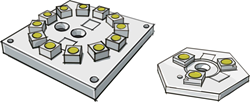The Zhaga Consortium, a global lighting-industry consortium that is standardizing LED light engines and associated components, has published Book 9 as its latest interface specification.
Zhaga Book 9 is a specification for LED light engines that consist of LED modules with a ring-shaped light-emitting surface, and a separate LED driver (electronic control gear). Book 9 can be downloaded from the Zhaga website.
 |
|
The Zhaga Consortium Book 9 is a specification for LED light engines that consist of LED modules with a ring-shaped light-emitting surface and separate LED driver. (The Zhaga Consortium/LEDinside) |
The LED modules defined in Book 9 are small in size, with a simple construction and a low profile (4mm height). The light output is typically in the order of several hundred to around one thousand lumens.
These features mean that Book 9 LED light engines are highly suited for use in LED luminaires for consumer lighting applications, such as small spotlights, track lighting and other compact luminaires. However, Zhaga does not restrict the applications that can be addressed.
“Zhaga is evolving to meet the needs of the lighting market,” said Musa Unmehopa, Secretary General of the Zhaga Consortium. “Compared with our earlier Books, which are aimed at professional lighting applications, Book 9 represents a shift towards the consumer sector.”
Book 9 contains two categories, which are defined according to the maximum size of the ring-shaped light-emitting surface (LES). The LES is the area of the module through which the light is emitted.
The RL25 category has an LES ring with inner and outer diameters of approximately 20 and 30 mm, respectively. For smaller modules in the RL12 category, these values are approximately 7 and 17 mm, respectively.
Each LED module has one or more optics contact areas (OCAs). An OCA is a surface with a defined shape and location for placement of the luminaire optics, such as reflectors or lenses.
The Zhaga specification also defines a demarcation boundary, which is the maximum area that the module can occupy. For the RL25 category, this boundary is a rectangular shape measuring 35.0 x 32.5 mm, while for RL12 the limit is a hexagonal shape with an edge length of 10 mm.
Book 9 LED modules can be mounted in a luminaire by means of screws. Zhaga defines the size and position of screw holes, because this is one of the essential features that ensure that different Book-9-compliant LED modules can be used interchangeably.
However, many other features – such as the luminous flux or efficacy of the LED modules – are not restricted by the Zhaga specifications. This allows component suppliers to offer differentiated and value-added products.
Zhaga members are able to submit their products for certification, which involves compliance testing by third-party test labs. Certified products are the only ones allowed to carry the Zhaga logo.





 CN
TW
EN
CN
TW
EN






